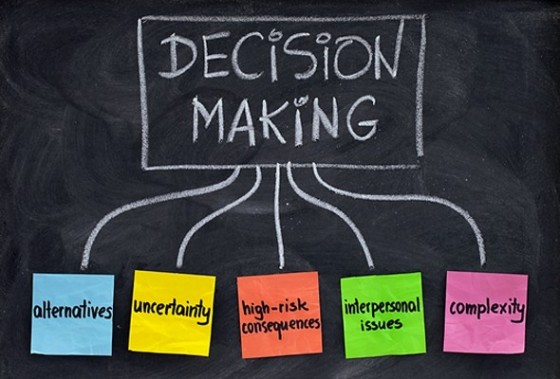 Every day, we are confronted with choices and need to make decisions. “What do I wear for work today?” “Should I eat out or pack lunch?” “Which college should I go to?” “Should I resign and seek greener
Every day, we are confronted with choices and need to make decisions. “What do I wear for work today?” “Should I eat out or pack lunch?” “Which college should I go to?” “Should I resign and seek greener
pastures elsewhere?”
Some decisions are easy to make and have little to no impact on our future. And then there are some tough decisions that we need to take seriously because our future depends on these.
As a personal and executive coach, I have witnessed smart men and women make bad decisions and I have to ask myself why we make bad decisions.
The brain and the decision-making process
As the old adage goes, hindsight is always 20/20. It is always easy to make the right choice after the fact. But what exactly happens to our brains when we are confronted with tough choices? Why do we sometimes make bad decisions?
In a study conducted by researchers supported by the Wellcome Trust and European Research Council, it was discovered that two critical factors influence the human brain during the decision-making process: the reward and the effort required.
In most cases, the brain chooses the option with the maximum amount of reward with the smallest amount of required effort.
Why good people make bad choices
Sometimes, the path of least resistance is not the better choice.
Apart from the fact that our brains are hardwired to select the option with the highest reward and least amount of required effort, there are a few factors that lead to poor choices.
Fear
Over the course of evolution, humans have become hardwired to fear making the wrong choices. And when we encounter tough decisions, certain parts of our brain responsible for our emotions increase their activity. In turn, this increase in activity makes us feel more stressed, clouding our judgment.
Past decisions
We’ve been burned by bad decisions at one point or another. And these bad decisions become seared into our memories and our brains go back to these when confronted with tough choices.
Trouble is, these memories can also hamper our ability to make the right choices, especially the outcomes of our previous choices. As such, it is not unusual for us to choose an option that we perceive to have pleasant outcomes similar to our previous experience.
Poor information
Bad decisions can come as a result of the lack or poor quality of information available. When we have a hazy or partial view of a situation and possible outcomes, we become susceptible to making poor choices.
And on the converse side of the coin, when we are confronted with too much information, we are paralyzed into inaction.
Our habits
Over time, we develop certain habits that may be detrimental to making the right choices. These include laziness, isolation, lack of foresight, and indecisiveness.
Habits that will help you make better choices
Does that mean that we are consigned to a fate of making poor choices?
Although it is practically impossible to avoid making poor decisions, there are a few habits that we can develop and cultivate that will teach us how to overcome obstacles in life and enable us to make smarter choices in the future.
Here’s how you can set yourself up for success.
Sleep on it
If you have ample time to decide on a particular matter, sleep on it. Often, we make bad decisions because we are tired and our serotonin and dopamine levels are low. These conditions usually occur in the latter part of the day.
This is why you should make your decisions early in the day when you are fully rested. If it is not possible to decide the following day, take a short nap to relax and reset your mind.
Have a snack
When our physical desires, like hunger, have not yet been taken care of, we are prone to making poor decisions. Remember the advice that you should not shop for groceries when you are hungry? Essentially, that is the same thing.
Narrow down your choices
If there are more than two choices available, it becomes easier for us to be overwhelmed and make hasty decisions. As much as possible, narrow down your choices to the smallest possible number.
Breathe in some fresh air
High levels of carbon dioxide can adversely affect how our brains function. When confronted with a tough decision to make, take a short walk and breathe in some fresh air.
Put yourself in someone else’s shoes
Our ability to make the right decisions can be undermined by our own subjectivity. One way to circumvent that is to put yourself in someone else’s shoes.
Remember how you can give a friend impartial and objective advice because you are not personally invested in the outcomes? Try the same thing for yourself and imagine yourself giving advice to someone else.
Reverse your assumptions
Often, we have a set of assumptions that we use in making decisions. If you find yourself making the same mistakes in the decision-making process, why not consider challenging these assumptions? Add another option: something that you do not usually do or think of.
Often, we do not have the luxury of having a friend or a life coach to guide us through tough choices. We can, however, cultivate the aforementioned habits to make smarter decisions on our own.
AUTHOR BIO
 Salma El-Shurafa is an experienced Executive Coach and founder of The Pathway Project. She is a Professional Certified Coach by the International Coaching Federation (ICF), a Certified Professional Co-Active Coach from The Coaches Training Institute (CTI) and a graduate of CTI’s Co-Active Leadership program.
Salma El-Shurafa is an experienced Executive Coach and founder of The Pathway Project. She is a Professional Certified Coach by the International Coaching Federation (ICF), a Certified Professional Co-Active Coach from The Coaches Training Institute (CTI) and a graduate of CTI’s Co-Active Leadership program.

